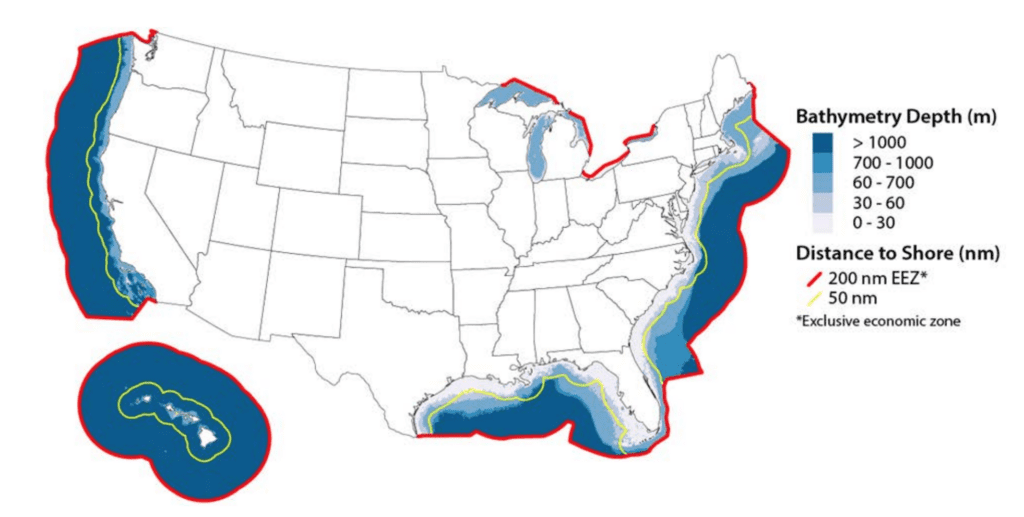Offshore Wind and Green Hydrogen Offer Great Opportunities for Gulf Coast States
The U.S. Gulf Coast offers some of the greatest potential for renewable energy development in the country. According to a National Renewable Energy Laboratory (NREL) study, Florida, Texas, and Louisiana rank second, third, and fourth, respectively, in net technical energy resource potential for offshore wind. The large energy resource in these three southern states is attributed to a large quantity of ocean area that encompass relatively long coastlines and wide continental shelves (Figure 1).

Greater New Orleans Inc. (GNO) is the regional economic development nonprofit organization serving the 10-parish region of Southeast Louisiana that includes Jefferson, Orleans, Plaquemines, St. Bernard, St. Charles, St. James, St. John the Baptist, St. Tammany, Tangipahoa, and Washington parishes. GNO is keenly focused on developing a thriving offshore wind industry in its region. Among the initiatives it oversees is the GNOwind Alliance, which is comprised of more than 180 organizations that GNO says “provide the expertise to grow the region and state as an energy leader.”
“[The GNOwind Alliance] was really launched with the understanding that there was a lot of activity and a lot of interest in the forthcoming leases in the Gulf of Mexico around wind development, and recognizing that not only do we have this lease potential in the Gulf of Mexico, but we also have this incredible industrial base across south Louisiana to connect some of this green energy to,” Lacy McManus, executive director of Future Energy at GNO Inc., said as a guest on The POWER Podcast.
McManus suggested that south Louisiana’s history with the oil and gas industry positions it to quickly adapt and capitalize on the offshore wind potential. She said many of the services that are going to be needed—the labor profiles, the workforce, and even some of the policy and regulatory experience necessary to develop the wind sector—borrow from the oil and gas industry. “We have a lot of that already in our landscape,” said McManus. “It’s where we are fortunate because I think that’s going to really catalyze a lot of our activity, and add to the momentum, and the speed and efficiencies with which we’re able to deliver to companies and industries coming in.”
GNOwind Alliance is already supporting workforce programs that train workers to transfer skills from oil and gas to wind energy through a partnership with academic and industry allies. “We work hand in glove with our higher education landscape here in Louisiana, but specifically at GNO Inc., we have a fantastic relationship with both LCTCS, which is the Louisiana Community and Technical College System, as well as with the Board of Regents, who oversees all of our higher education institutions,” McManus said.
GNO leadership made the decision about a decade ago to have all of the presidents of the four-year schools in the Greater New Orleans region, and all the chancellors of the two-year community colleges in the region, on its board of directors. “For the last 10-plus years, all of that higher ed leadership has been sitting in the same room with all of the business leadership in the region on a monthly basis at our board meetings. They get the scoop and the understanding, and hear straight from the horse’s mouth on new announcements that we have coming in,” said McManus.
Beyond offshore wind, McManus sees opportunity for southeastern Louisiana in the green hydrogen economy. “Louisiana and our industry base actually consumes one-third of the nation’s hydrogen. So, that’s a lot of gray hydrogen that’s currently going into our industrial footprint,” said McManus. “With the opportunity to develop more wind in the Gulf, we have a really unique, in my view, sort of once in a generation chance to shift some of that gray hydrogen that we’re currently using in our industrial footprint over to green hydrogen.”
To hear the full interview with McManus, which includes more on the role she sees hydrogen playing in the future and an initiative GNO has initiated toward that end, among other things, listen to The POWER Podcast. Click on the SoundCloud player below to listen in your browser now or use the following links to reach the show page on your favorite podcast platform:
For more power podcasts, visit The POWER Podcast archives.
—Aaron Larson is POWER’s executive editor (@AaronL_Power, @POWERmagazine).